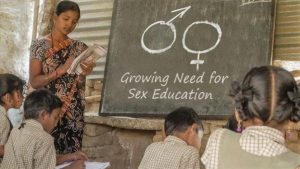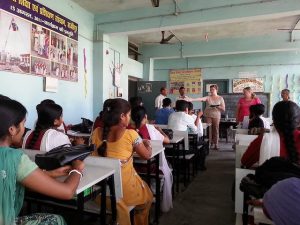The Importance of Sex Education in Indian Schools
Sex education has long been a controversial topic in many parts of the world, including India. However, its importance in fostering informed, healthy, and responsible young adults cannot be overstated. In a country where taboos surrounding discussions of sex and sexuality persist, integrating comprehensive sex education into Indian schools is essential for the well-being of the future generation. This blog will delve into the importance of sex education in Indian schools, exploring the benefits, the need for it, and the challenges faced in implementing it.
BEST CAREER COUNSELLOR FOR STUDENTS IN DELHI NCR
Understanding Sex Education
Sex education, often referred to as comprehensive sexuality education (CSE), is a program that provides information about human sexuality, including biological, emotional, mental, and social aspects. This education goes beyond the basics of reproduction and anatomy and includes discussions on consent, relationships, gender, sexual health, and personal boundaries.
In India, where sexual taboos are still prevalent, discussions about sexuality often take place in silence, leading to misinformation, stigma, and unsafe practices. Comprehensive sex education can address these gaps, providing students with the tools to understand and navigate their own sexuality, relationships, and personal health.
Top career counseling for students in North Delhi: Rohini, Pitampura, and Shalimar Bagh
The Need for Sex Education in India
India, with its rapidly growing population and youthful demographic, faces several challenges related to sexual health, reproductive rights, and gender equality. There is a clear need for effective sex education to address these issues.
1. Prevention of Sexually Transmitted Infections (STIs)
One of the primary benefits of sex education is the prevention of sexually transmitted infections (STIs), including HIV/AIDS. According to the National Family Health Survey (NFHS), India has seen an alarming rise in the number of STIs in recent years, especially among young adults. Many young people, particularly in rural areas, lack awareness about safe sexual practices, such as condom use, which leads to higher transmission rates.
A comprehensive sex education curriculum can equip students with knowledge about the transmission and prevention of STIs. This knowledge not only reduces the spread of infections but also encourages responsible sexual behavior, helping to control the public health crisis.
Best career counseling services in South Delhi: Hauz Khas, Saket, and Greater Kailash
2. Reduction in Teenage Pregnancies
India has one of the highest rates of teenage pregnancies globally, a situation that is exacerbated by a lack of access to sexual health education. Many teenagers are unaware of contraception methods and reproductive health, which often results in unintended pregnancies. This is especially problematic in rural areas, where traditional norms and poverty hinder access to family planning services.
Sex education can help reduce teenage pregnancies by teaching students about contraception, reproductive rights, and the emotional, social, and financial implications of early pregnancy. When teenagers have access to reliable information about their bodies and sexual health, they are better equipped to make informed decisions.
3. Promoting Gender Equality and Respect for Consent
In a patriarchal society like India, issues related to gender inequality, gender-based violence, and consent are widespread. Sex education plays a crucial role in promoting gender equality and respect for individual boundaries. By teaching students about consent, mutual respect, and healthy relationships, sex education can combat violence, harassment, and discrimination based on gender.
Educating young people about consent empowers them to take control of their own bodies and make decisions about their sexual health. It also helps them understand the importance of respecting the boundaries of others, fostering a culture of mutual respect in society.
Best career counseling services in West Delhi: Janakpuri, Rajouri Garden, and Punjabi Bagh
4. Combating Misinformation and Myths
In India, a lack of open discussion about sex often leads to the spread of myths and misconceptions about sexual health. Many young people are exposed to incorrect or misleading information from peers, media, or internet sources. This misinformation can lead to risky behaviors, unsafe sexual practices, and poor sexual health outcomes.
By introducing accurate and reliable information into the school curriculum, sex education can debunk myths and misconceptions. This helps students to form a healthy, informed, and realistic understanding of sexuality and relationships.
5. Addressing Mental and Emotional Well-being
Sex education is not only about the physical aspects of sexuality; it also involves the emotional and mental dimensions. Adolescence is a time of significant emotional and psychological development, and young people often face challenges related to body image, peer pressure, self-esteem, and the pressures of romantic relationships.
Comprehensive sex education can provide students with the tools to navigate these emotional challenges. By promoting body positivity, self-acceptance, and healthy communication skills, sex education contributes to better mental health and emotional well-being among students.
The Benefits of Sex Education in Indian Schools
The inclusion of sex education in Indian schools can have far-reaching benefits, not only for the individual students but also for society as a whole. Here are some of the key advantages:
-
Empowerment of Students: Knowledge is power. By providing students with accurate and comprehensive information about their bodies, sexual health, and relationships, sex education empowers them to make informed and responsible decisions.
-
Fostering Healthy Relationships: Sex education helps students understand what constitutes a healthy relationship. It teaches them about mutual respect, consent, communication, and the importance of emotional well-being in relationships.
-
Reduction in Social Stigma: In many parts of India, discussing sexual health is stigmatized. By normalizing conversations around sex and sexuality in a safe and educational environment, sex education helps to reduce this stigma. This creates a more open, informed, and accepting society.
-
Promoting Public Health: Comprehensive sex education has been proven to reduce rates of HIV, STIs, and teenage pregnancies, leading to improved public health outcomes. In a country like India, where health infrastructure is often limited, education can be a cost-effective way to address these public health issues.
-
Preparing Students for Adulthood: Sex education is essential for preparing young people for adulthood. It equips them with the knowledge and skills to navigate the challenges of sexual health, relationships, and personal responsibility as they transition into adulthood.
The Challenges in Implementing Sex Education in India
Despite the clear need for sex education in Indian schools, its implementation faces several challenges.
1. Cultural and Religious Barriers
India’s cultural and religious norms often view sex and sexuality as taboo subjects, making it difficult to have open conversations about them. Many parents and community leaders fear that sex education may encourage promiscuity or lead to the erosion of traditional values. These concerns can hinder the acceptance and implementation of sex education programs.
2. Lack of Trained Educators
In many Indian schools, there is a shortage of trained and qualified educators who can teach sex education. Teachers may feel uncomfortable discussing such sensitive topics, and many lack the necessary training to address the complexities of sexual health, relationships, and emotional well-being.
3. Inconsistent Curriculum
In India, the sex education curriculum is often inconsistent across states and schools. While some states have made significant strides in implementing comprehensive sex education, others lag behind. This inconsistency means that many students across the country are deprived of vital knowledge and information about their sexual health.
4. Resistance from Parents and Communities
Many parents and community members are resistant to the idea of sex education in schools. Some believe that such topics should be discussed only at home, while others fear that sex education might corrupt their children or lead to risky behaviors. Overcoming these fears requires effective communication and community engagement to demonstrate the benefits of sex education.
Best career counseling services in East Delhi: Laxmi Nagar, Preet Vihar, and Mayur Vihar.Conclusion
Sex education is a vital tool for promoting the health, well-being, and rights of young people in India. By providing students with the knowledge and skills they need to make informed decisions about their bodies, relationships, and sexual health, schools can empower the next generation to lead healthier, safer, and more fulfilling lives.
While challenges in implementation remain, it is clear that the benefits of comprehensive sex education far outweigh the drawbacks. For India to thrive as a progressive, inclusive, and health-conscious society, it is crucial that sex education be integrated into the curriculum of schools across the country. This is not just about educating young people; it’s about building a healthier, more informed, and more respectful society for all.











